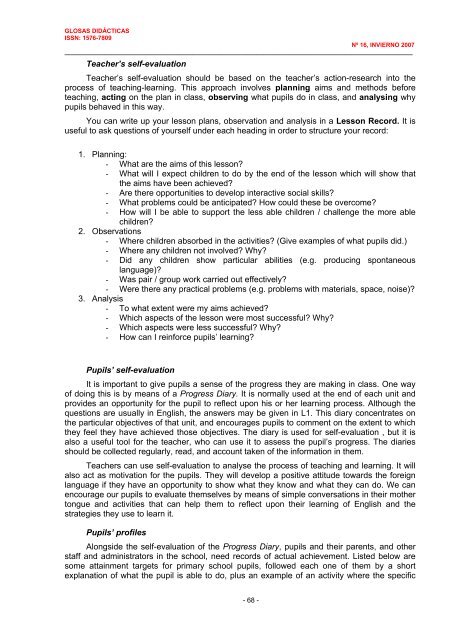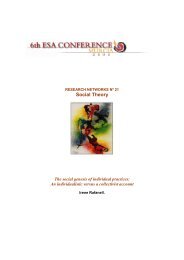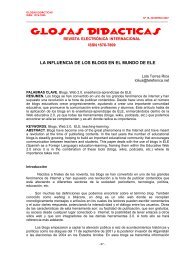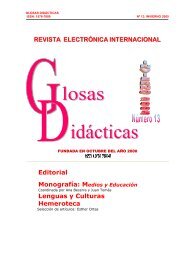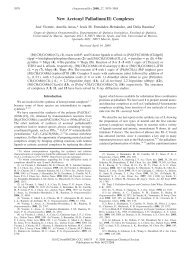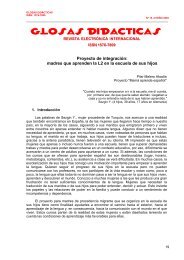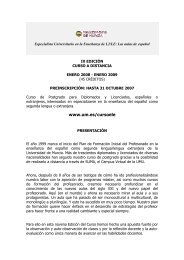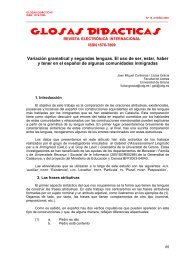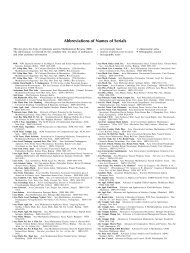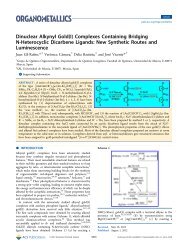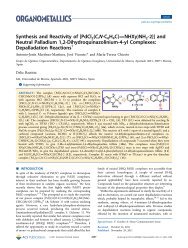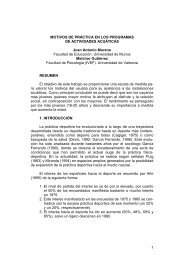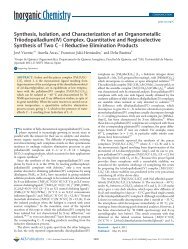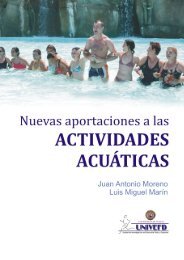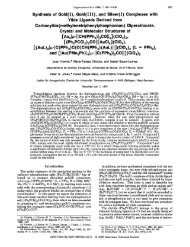la tostadora se ha vuelto asesina y el ordenador no me puede verâ¦
la tostadora se ha vuelto asesina y el ordenador no me puede verâ¦
la tostadora se ha vuelto asesina y el ordenador no me puede verâ¦
You also want an ePaper? Increase the reach of your titles
YUMPU automatically turns print PDFs into web optimized ePapers that Google loves.
GLOSAS DIDÁCTICAS<br />
ISSN: 1576-7809<br />
Nº 16, INVIERNO 2007<br />
_______________________________________________________________________________________________________<br />
Teacher’s <strong>se</strong>lf-evaluation<br />
Teacher’s <strong>se</strong>lf-evaluation should be ba<strong>se</strong>d on the teacher’s action-re<strong>se</strong>arch into the<br />
process of teaching-learning. This approach involves p<strong>la</strong>nning aims and <strong>me</strong>thods before<br />
teaching, acting on the p<strong>la</strong>n in c<strong>la</strong>ss, ob<strong>se</strong>rving w<strong>ha</strong>t pupils do in c<strong>la</strong>ss, and analysing why<br />
pupils be<strong>ha</strong>ved in this way.<br />
You can write up your lesson p<strong>la</strong>ns, ob<strong>se</strong>rvation and analysis in a Lesson Record. It is<br />
u<strong>se</strong>ful to ask questions of your<strong>se</strong>lf under each heading in order to structure your record:<br />
1. P<strong>la</strong>nning:<br />
- W<strong>ha</strong>t are the aims of this lesson?<br />
- W<strong>ha</strong>t will I expect children to do by the end of the lesson which will show t<strong>ha</strong>t<br />
the aims <strong>ha</strong>ve been achieved?<br />
- Are there opportunities to dev<strong>el</strong>op interactive social skills?<br />
- W<strong>ha</strong>t problems could be anticipated? How could the<strong>se</strong> be overco<strong>me</strong>?<br />
- How will I be able to support the less able children / c<strong>ha</strong>llenge the more able<br />
children?<br />
2. Ob<strong>se</strong>rvations<br />
- Where children absorbed in the activities? (Give examples of w<strong>ha</strong>t pupils did.)<br />
- Where any children <strong>no</strong>t involved? Why?<br />
- Did any children show particu<strong>la</strong>r abilities (e.g. producing spontaneous<br />
<strong>la</strong>nguage)?<br />
- Was pair / group work carried out effectiv<strong>el</strong>y?<br />
- Were there any practical problems (e.g. problems with materials, space, <strong>no</strong>i<strong>se</strong>)?<br />
3. Analysis<br />
- To w<strong>ha</strong>t extent were my aims achieved?<br />
- Which aspects of the lesson were most successful? Why?<br />
- Which aspects were less successful? Why?<br />
- How can I reinforce pupils’ learning?<br />
Pupils’ <strong>se</strong>lf-evaluation<br />
It is important to give pupils a <strong>se</strong>n<strong>se</strong> of the progress they are making in c<strong>la</strong>ss. One way<br />
of doing this is by <strong>me</strong>ans of a Progress Diary. It is <strong>no</strong>rmally u<strong>se</strong>d at the end of each unit and<br />
provides an opportunity for the pupil to reflect upon his or her learning process. Although the<br />
questions are usually in English, the answers may be given in L1. This diary concentrates on<br />
the particu<strong>la</strong>r objectives of t<strong>ha</strong>t unit, and encourages pupils to com<strong>me</strong>nt on the extent to which<br />
they fe<strong>el</strong> they <strong>ha</strong>ve achieved tho<strong>se</strong> objectives. The diary is u<strong>se</strong>d for <strong>se</strong>lf-evaluation , but it is<br />
also a u<strong>se</strong>ful tool for the teacher, who can u<strong>se</strong> it to as<strong>se</strong>ss the pupil’s progress. The diaries<br />
should be collected regu<strong>la</strong>rly, read, and account taken of the information in them.<br />
Teachers can u<strong>se</strong> <strong>se</strong>lf-evaluation to analy<strong>se</strong> the process of teaching and learning. It will<br />
also act as motivation for the pupils. They will dev<strong>el</strong>op a positive attitude towards the foreign<br />
<strong>la</strong>nguage if they <strong>ha</strong>ve an opportunity to show w<strong>ha</strong>t they k<strong>no</strong>w and w<strong>ha</strong>t they can do. We can<br />
encourage our pupils to evaluate them<strong>se</strong>lves by <strong>me</strong>ans of simple conversations in their mother<br />
tongue and activities t<strong>ha</strong>t can h<strong>el</strong>p them to reflect upon their learning of English and the<br />
strategies they u<strong>se</strong> to learn it.<br />
Pupils’ profiles<br />
Alongside the <strong>se</strong>lf-evaluation of the Progress Diary, pupils and their parents, and other<br />
staff and administrators in the school, need records of actual achieve<strong>me</strong>nt. Listed b<strong>el</strong>ow are<br />
so<strong>me</strong> attain<strong>me</strong>nt targets for primary school pupils, followed each one of them by a short<br />
exp<strong>la</strong>nation of w<strong>ha</strong>t the pupil is able to do, plus an example of an activity where the specific<br />
- 68 -


